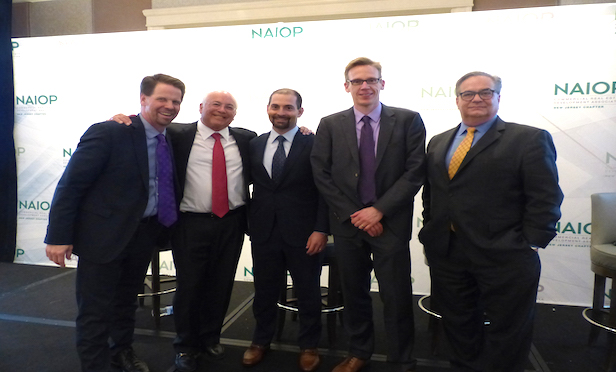 From left, panel moderator Tom Bergeron, Editor, ROI-NJ; Andrew Merin, executive vice chairman, Cushman & Wakefield; Ed Russo, CEO, Russo Development; Alexander Heil, chief economist, Port Authority of New York & New Jersey and Chris Paladino, president, DEVCO
From left, panel moderator Tom Bergeron, Editor, ROI-NJ; Andrew Merin, executive vice chairman, Cushman & Wakefield; Ed Russo, CEO, Russo Development; Alexander Heil, chief economist, Port Authority of New York & New Jersey and Chris Paladino, president, DEVCO
SHORT HILLS, NJ—A panel of New Jersey-based real estate executives predict that the economy in the Garden State will cool somewhat in 2020, while the industrial sector will remain hot.
The panel convened at the NAIOP NJ Annual Meeting last week at the Short Hills Hilton covered a host of topics, including the expected re-introduction of incentives to the state's controversial economic development program.
Alexander Heil, chief economist for the Port Authority of New York and New Jersey, noted that one year ago he predicted a possible recession in 2020 due in part to the current US trade policy placing tariffs on hundreds of billions of dollars of imports.
Heil said consumers came to the rescue of the American economy in 2019, and confidence has trended up for a considerable length of time. However, he added that confidence among CEOs has deteriorated and business investment has declined, which are several factors pointing to a possible recession later this year, he noted.
"The Federal Reserve in New York's model, which is a reliable predictor, still sees a 24% recession probability in 2020, which is down from 35%," said Heil. "Manufacturing, which is a large contributor to the economy, is already in recession and employment growth has stalled. In addition, the federal government is cutting back after a period of significant spending."
He cited additional negative factors ranging from the rising federal deficit and a decline in the rate of job creation to the cost of climate change and wage gains that have not kept pace with inflation. While not coming out and predicting a recession in 2020, Heil did say, "We are not going to be seeing as much economic growth as in 2019, both nationally and regionally."
Regionally, he pointed to a "a mosaic of important economic issues," that will put downward pressure on economic growth, including declining labor force participation, housing affordability, a shortage of skilled workers in specific sectors and tax law changes that have adversely affected the local real estate market.
New Jersey is expected to continue to lag behind New York and the region in employment growth, but recent gains seen in non-finance sectors such as healthcare, education and technology will continue.
ROI-NJ editor and chief content officer Tom Bergeron led a panel discussion that featured Christopher Paladino, president of DEVCO; Andrew Merin, vice chairman of Cushman & Wakefield; and Ed Russo, president of Russo Development.
Bergeron noted, "Incentives, or the lack thereof, seem to be hurting real estate and the way businesses outside the state view us." Paladino agreed, saying, "There are going to be incentives, probably sometime this spring, and they will likely be broader than what was first proposed. But there has been some damage done, including to the reputation of the New Jersey Economic Development Authority. I'm fearful that when we do have incentives, we will have a long climb back."
Russo added, "It's not incentives or bust. Obviously, they are important and there is tremendous uncertainty surrounding the next incentives to come out of EDA. But if it takes another couple of months, it doesn't mean we can't have a positive first half of the year."
The panelists agreed that incentives are critical to redevelopment initiatives in cities such as Newark, Jersey City, Trenton and Paterson and the lack of incentives have come at a cost.
"Pulling these incentives is going to hurt," said Merin. "We're already seeing it in Jersey City, where there had been such progress but now things are terrible in the office sector."
"There are real challenges in places like Paterson," added Paladino. "If you look at some of the special things that were done in Camden and want to do it in Paterson or Trenton, which are really struggling, you'll need to decide it's an important matter of public policy and create incentives no one else has."
Russo said residential development in Paterson is difficult for a number of reasons, but the potential in Newark is tremendous. "There's been a lot of talk about redevelopment, but not a lot has been built relative to the size of population. That's absolutely going to change in the next one to three years."
C&W's Merin predicts that the industrial market will continue to be strong, noting that the vacancy rate in central and northern New Jersey currently stands at 2.7% and the average rent is $8.90-per-square-foot.
He added that of the 9 million square feet of industrial space delivered last year, a total of 60% was pre-leased.
Russo added, "Over the past 12 to 24 months, it's been shocking how much investment, land values and rents have increased. We believe it's going to be unparalleled in 2020, and we'll see $20-per-square-foot rents in prime states across the country when in the past we couldn't get $10. What we don't know is whether it's the beginning of a trend with a lot of runway or if the market is overheated."
© 2025 ALM Global, LLC, All Rights Reserved. Request academic re-use from www.copyright.com. All other uses, submit a request to [email protected]. For more information visit Asset & Logo Licensing.





